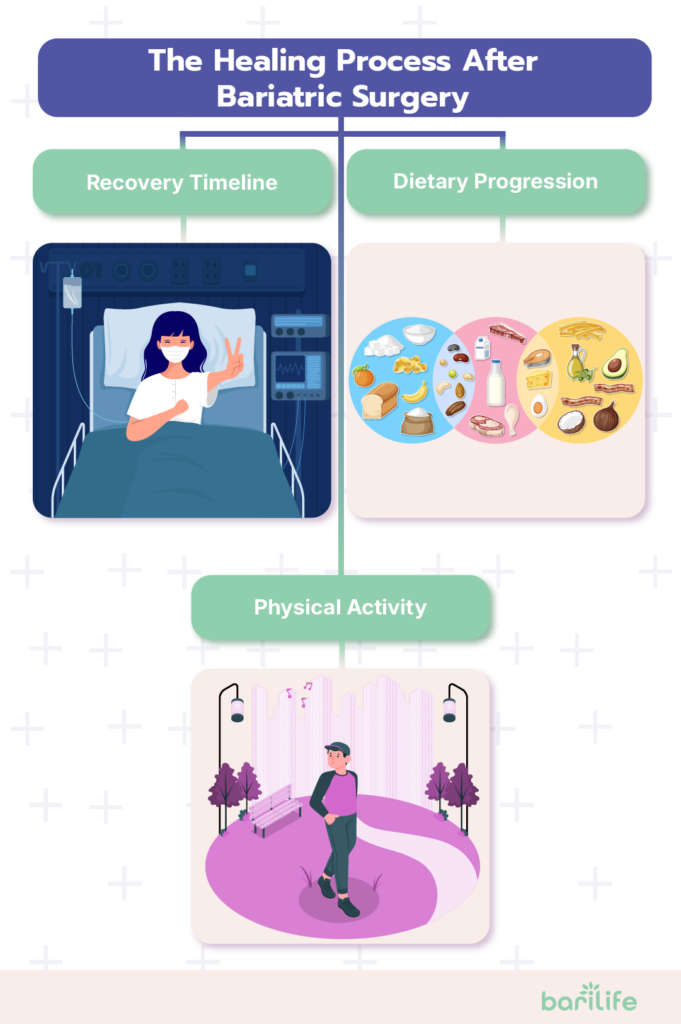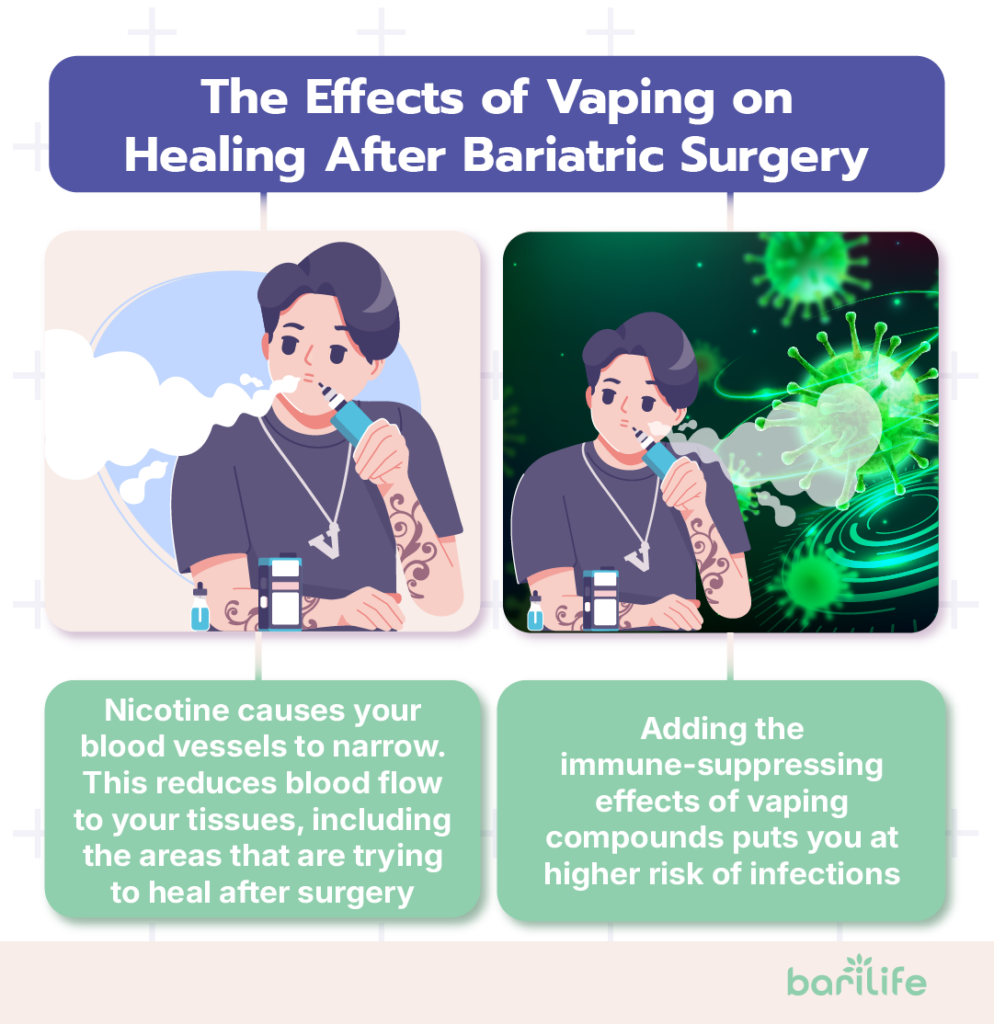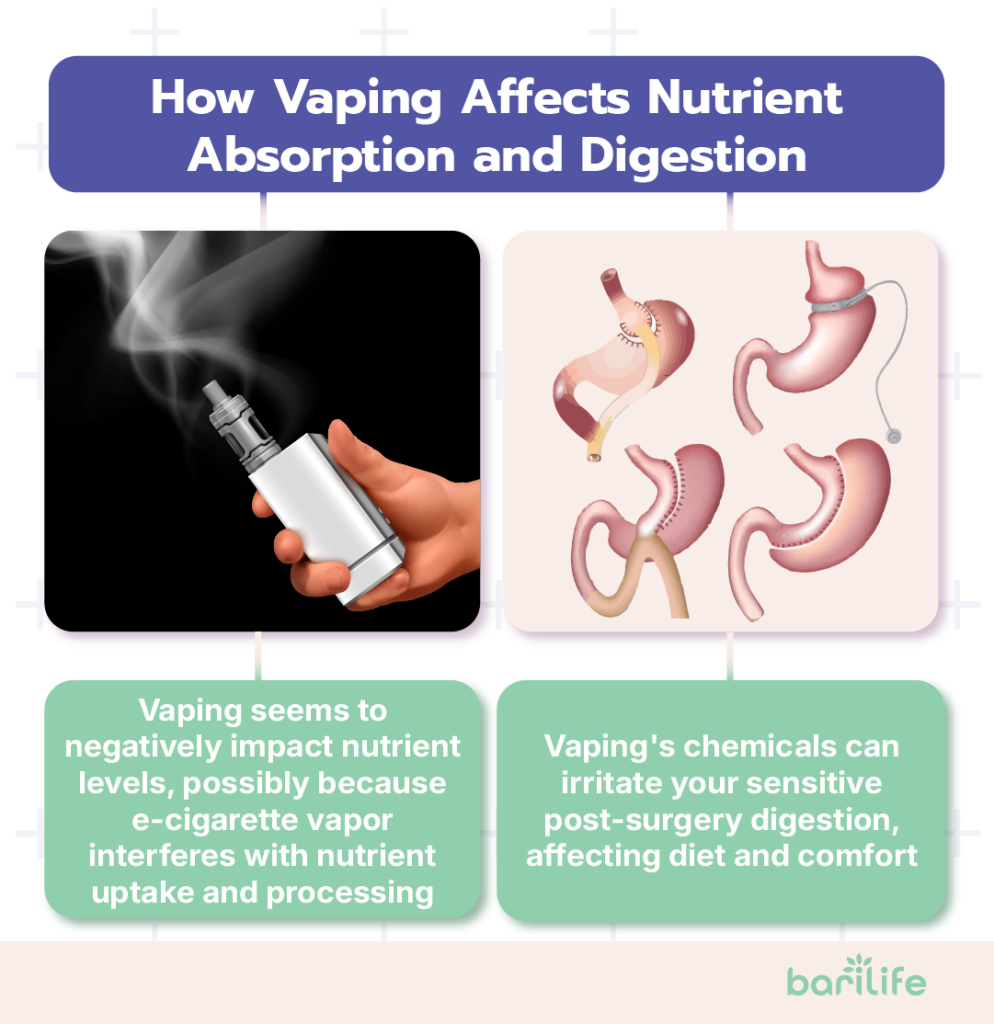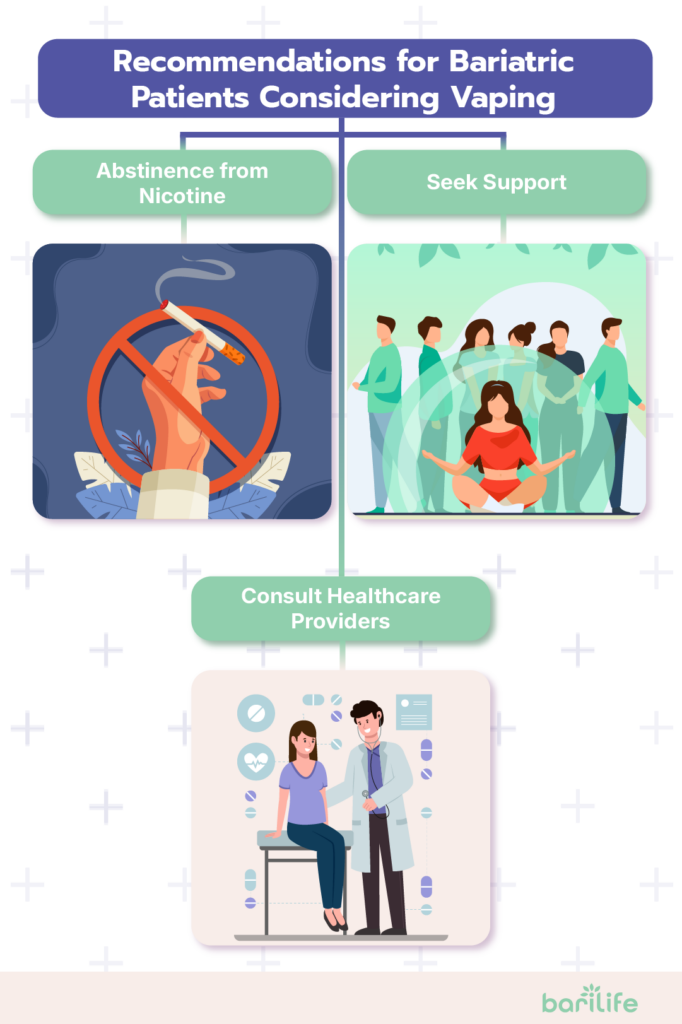Key Takeaways:
- Nicotine from vaping can slow down your healing post bariatric surgery by reducing blood flow to healing tissues
- Vaping may worsen the nutrient absorption issues that already exist after weight loss surgery
- The first few months after surgery are a critical time to avoid vaping to ensure the best outcome
Perhaps you vaped before your surgery and are thinking about when you can start again. Or maybe you’re considering vaping instead of smoking, thinking it might be a healthier option. Either way, it’s important to understand how vaping and bariatric surgery interact with each other.
Let’s look at what happens in your body after weight loss surgery and how vaping might affect your recovery and long-term health.
Table of Contents
The Healing Process After Bariatric Surgery

Bariatric surgery is a major procedure that changes how your digestive system works. Your body needs time to heal and adjust to these changes.
Recovery Timeline
Most individuals spend a day or two at the hospital after bariatric surgery. During this time, your medical team monitors you closely to make sure you’re stable and starting to heal properly.
Once you’re home, your body continues to heal for several weeks. You can typically return to your normal activities within four to six weeks. During this bariatric surgery recovery time, your surgical wounds are closing, your digestive system is adjusting to its new arrangement, and your body is adapting to the changes in how you eat and digest food.
Complete recovery can take several months to a year.
Dietary Progression
After bariatric surgery, you’ll follow a very specific diet plan that progresses through several stages. You’ll start with clear liquids like water and broth, then move to full liquids like protein shakes. Next comes pureed foods, then soft foods, and finally, regular solid foods.
This careful progression usually takes around eight weeks and gives your newly modified stomach and intestines time to heal without being stressed. Your body is also learning to digest food differently and absorb nutrients from a smaller amount of food.
Physical Activity
Believe it or not, you’ll be encouraged to get up and move shortly after surgery! Walking helps prevent blood clots and promotes good circulation, which is essential for healing. As the days and weeks pass, you’ll gradually increase your physical activity.
Good blood circulation is key during recovery because it delivers oxygen and nutrients to your healing tissues. Any substance that affects your circulation, like the nicotine in vaping products, can impact how quickly and effectively you heal.
The Effects of Vaping on Healing After Bariatric Surgery

Vaping before and after bariatric surgery poses significant risks to your recovery. Here are several reasons why.
Nicotine and Healing
The biggest concern with vaping after surgery is nicotine. Whether it comes from traditional cigarettes or e-cigarettes, nicotine causes your blood vessels to narrow (constrict). This reduces blood flow to your tissues, including the areas that are trying to heal after surgery.
When blood flow is reduced, less oxygen and fewer nutrients reach your surgical sites. This can slow down healing. Slower healing means a longer recovery time and a higher risk of complications like:
- Leaks at surgical connections
- Infections
- Poor wound healing
- Blood clots
Many surgeons ask patients to stop using nicotine products (including vaping) for at least 4-6 weeks before surgery and 4-6 weeks after for these very reasons.
Infection Risk
Vaping and bariatric surgery don’t mix well when it comes to your immune system. Research suggests that vaping may impair your immune health, making it even more difficult for your body to fight off germs.
After any major surgery, your immune system is already stressed as it works to help you heal. Adding the immune-suppressing effects of vaping compounds puts you at higher risk of infections.
Infections after bariatric surgery can be serious and may require additional treatments, medications, or even repeat surgeries. They can also slow down your weight loss journey and prolong your recovery time.
How Vaping Affects Nutrient Absorption and Digestion
The relationship between vaping after bariatric surgery and nutrition is particularly concerning.
Nutrient Absorption
Bariatric surgery intentionally changes how your body absorbs nutrients. Depending on the type of surgery you had, you may be at risk for deficiencies in:
- Vitamin B12
- Iron
- Calcium
- Vitamin D
- Protein

Vaping appears to worsen these potential deficiencies. The chemicals in e-cigarette vapor may interfere with how your body absorbs and uses these essential nutrients. When you’re already at risk for nutritional deficiencies due to your surgery, adding another factor that could worsen the problem is particularly risky.
These nutritional impacts may not be obvious right away, but over time, they can lead to serious health problems like anemia, bone loss, muscle wasting, and neurological issues.
Gastrointestinal Irritation
The chemicals in e-cigarettes don’t just affect your lungs—they can also irritate your digestive system. Vaping may cause or worsen:
- Nausea
- Stomach pain
- Acid reflux
- Diarrhea
- Bloating
After surgery, your digestive system is especially sensitive as it adjusts to its new configuration. Adding irritating chemicals through vaping could make it harder to follow your post-surgery diet and might interfere with your comfort and healing.
Since proper nutrition is absolutely critical after weight loss surgery, anything that disrupts your eating or digestion could impact your weight loss results and overall health.
Addiction, Dependence, and Mental Health Implications
The psychological aspects of vaping before bariatric surgery and afterward deserve special attention, as they connect to some of the emotional challenges that can come with major weight loss.
Substance Transfer
Many experts in bariatric care have noticed an interesting pattern: some patients who successfully stop overeating after surgery may transfer their addiction-like relationship with food to other substances, including nicotine, alcohol, or shopping.
This “cross-addiction” or “addiction transfer” happens because the brain’s reward pathways that were previously activated by food need to find a new focus. Nicotine is particularly concerning because it’s highly addictive and delivers a powerful dopamine release, similar to what some people experience from foods.
If you used to turn to food for comfort, stress relief, or pleasure, you might be at higher risk of becoming dependent on vaping after surgery if you start or continue the habit.

Mental Health Considerations
Weight loss surgery brings major life changes—both positive and challenging. You’ll experience:
- A changing body image
- New dietary habits
- Different social dynamics around food
- Potentially unexpected emotional responses to rapid weight loss
These changes can sometimes result in stress, anxiety, or depression. Some people might turn to vaping as a way to cope with these feelings or manage stress. While this might seem helpful at the moment, it can create a new problem while not addressing the underlying emotional challenges.
Risks of Vaping for Bariatric Patients Long-Term
Beyond the immediate recovery period, vaping poses several long-term concerns for bariatric patients:
Chronic Health Issues
The long-term effects of vaping are still being observed, but evidence suggests that it can lead to:
- Lung inflammation and damage
- Increased risk of respiratory infections
- Cardiovascular problems
- Throat and mouth irritation
For people who have taken a major step toward improving their health through surgery, introducing these risks through vaping seems counterproductive.
Sustained Nutrient Deficiencies
Many patients need to take supplements forever to prevent deficiencies. Continued vaping may make these deficiencies more likely or more severe over time. The ongoing irritation to your digestive system and potential interference with nutrient absorption could create chronic health problems that might otherwise have been avoided.
Recommendations for Bariatric Patients Considering Vaping
If you’re thinking about vaping after bariatric surgery or wondering how to handle an existing vaping habit, here are some evidence-based recommendations:
Abstinence from Nicotine
The clearest guidance from medical professionals is to avoid nicotine in all forms, including vaping. This means:
- Quitting vaping at least 4-6 weeks before your surgery date
- Remaining nicotine-free throughout your recovery
- Ideally, using this opportunity to break free from nicotine dependence permanently
This recommendation is based on solid evidence about how nicotine affects healing, circulation, and surgical outcomes.

Seek Support
Quitting vaping can be challenging, especially during the already stressful time surrounding surgery. Don’t try to do it alone. Consider:
- Talking to your doctor about cessation medications or nicotine replacement therapies
- Joining support groups specifically for people quitting nicotine
- Working with a therapist who specializes in addiction
- Enlisting friends and family to support your efforts
Many bariatric programs offer comprehensive support services that can help with both the physical and emotional aspects of nicotine dependence.
Consult Healthcare Providers
Having open communication with your medical team is essential. If you’re struggling with vaping:
- Be honest about your current vaping habits
- Ask specifically about how vaping might affect your particular type of bariatric procedure
- Discuss any concerns about weight gain after quitting
- Work together to develop a realistic plan for quitting
Your bariatric team has probably helped many patients through the same challenges and can offer useful advice tailored to your situation.
Conclusion
Vaping after bariatric surgery poses significant risks to both your immediate recovery and your long-term health. The nicotine in vaping products constricts blood vessels, slowing healing and increasing the risk of complications. The chemicals in e-cigarettes may worsen the nutrient absorption challenges already present after bariatric surgery. Additionally, vaping could potentially replace food dependence with nicotine dependence, creating a new health problem.
For the best possible outcome, follow your surgical team’s guidance about avoiding vaping before and after your procedure. If you’re struggling to quit, ask about the support resources available through your bariatric program. Avoiding vaping helps ensure you’ll gain the maximum benefit of the life-changing procedure that is bariatric surgery.
How Bari Life Can Help
Bari Life is committed to supporting your recovery and long-term health after bariatric surgery with high-quality, bariatric vitamins and supplements that are easy to absorb, even when your digestive system has changed. Whether you’re looking for bariatric multivitamins, bariatric calcium chews, or even a liquid bariatric vitamin, Bari Life offers a full range of options tailored to your needs.
If you’re working to quit vaping and support your healing, Bari Life’s comprehensive nutritional products—including bariatric vitamins chewable, bariatric multivitamin with iron, and bariatric probiotic options—can help fill in any gaps caused by reduced nutrient absorption. In addition, bariatric vitamins for hair loss are available to help you maintain strong, healthy hair throughout your recovery.
To further support your post-op nutrition, Bari Life also offers bariatric protein shakes, bariatric protein bars, and bariatric snacks designed to be both delicious and nutrient-dense.

Take charge of your recovery and protect your health—shop Bari Life now to support your journey every step of the way.
If you want to learn more, why not check out these articles below:
- How Long After Bariatric Surgery Can You Swim?
- How Long After Bariatric Surgery Can I Go Back To Work?
- How Long After Bariatric Surgery Can You Have Sex?
- How Long After Bariatric Surgery Can I Drive?
- Why Are You Not Allowed To Use a Straw After Bariatric Surgery?
Resources
Auschwitz, E., et al. (2023). Mechanisms of E-Cigarette Vape-Induced Epithelial Cell Damage. Cells.
Debnath, M., et al. (2022). Effect of Electronic Cigarettes on the Gastrointestinal System. Cureus.
Recovery from weight loss surgery. (2024). NHS.
Transfer Addiction Following Bariatric Surgery. (2016). Obesity Action Coalition.Wiss, D., & Brewerton, T. (2020). Separating the Signal from the Noise: How Psychiatric Diagnoses Can Help Discern Food Addiction from Dietary Restraint. Nutrients.



What are your tips and tricks to post-bariatric success?